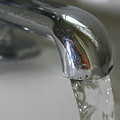 根據新的州立報告指出,紐澤西的居民從私人水井中取得的飲用水都被污染,而其中以超過州立標準的放射性污染物最為常見。這份由州立的私人水井測試計畫得到的報告涵蓋了由2002年到2007年間五年內的資料,還包括了超過八分之一的樣本,從估計紐澤西州中40萬座的私有居民飲用水中所抽樣。
根據新的州立報告指出,紐澤西的居民從私人水井中取得的飲用水都被污染,而其中以超過州立標準的放射性污染物最為常見。這份由州立的私人水井測試計畫得到的報告涵蓋了由2002年到2007年間五年內的資料,還包括了超過八分之一的樣本,從估計紐澤西州中40萬座的私有居民飲用水中所抽樣。
紐澤西的環保官員並沒有對這份報告有所評論,但是這份報告顯示檢測的51000座飲用水水井中,超過12%沒有達到飲用水標準,表示從這6120座水井取水的人,正在飲用受污染水源。在2290座水井之中,最常見的不合規範的情形就是放射線污染,在這份報告中稱之為「總體阿法粒子的活動。」
這個名稱「總體阿法粒子」不是指特定的污染物,指的是一群在飲用水中放射性物質的集合,在紐澤西州發現總體阿法粒子是第一次在這份報告中提及與評估。另外常見的違法情況是,在1445座水井中發現高量的砷;在1399座水井中發現高量的硝酸鹽;水中糞生大腸桿菌群或大腸桿菌在1136座水井中發現,揮發性的有機複合物在702座水井中發現,而汞在215座水井中發現。
以上的數字沒有包括在超過5200座水井裡發現了鉛,因為這個超乎常理的高鉛含量的抽樣,讓環境保護局甚至質疑了樣本的可靠度。「部分結果和我們對地下水質的預期相符合,」這份報告指出,「即使對砷的測試沒有嚴格要求的紐澤西,也比其他地區更常測試到砷含量過高的比率。」但是這份報告也指出,「其他的發現也讓我們更加瞭解地下水質,大腸桿菌的結果顯示紐澤西的地下水岩床可能有更嚴重的大腸桿菌污染。」
公務人員環境責任組織(PEER) 8月28日表示這份報告顯示大眾對於飲用水井的警覺性很低,因為人們沒有被規範要去通知左鄰右舍水源的污染問題,也沒有規定得去清理污染。「這份報告表示當你從紐澤西州飲用水時,你是在鋌而走險。」紐澤西公務人員環境責任組織的主任渥夫(Bill Wolfe)表示,渥夫是之前紐澤西環境保護局的分析員,「這份報告最後要闡述的就是州立的測試水質計畫已有缺陷,需要全面的改進。」
紐澤西沒有要求要改正從私有水井中發現的污染問題,該報告表示私有水井測試計畫和其相關的條文並沒有要求,若任何一項測試指標過高,需要立刻執行水質改善措施。而受污染的水源區的住戶也沒有受到通知的必要性,因為該條文寫道,「測試結果不可公開,而不合格水井的確實位置也不可以標明出來。」
詳參完整報告「水井水質測試結果-2002九月到2007四月」。
Tens of thousands of New Jersey residents are drinking polluted water from private wells, according to a new state report, and radioactive contamination is the most common violation of state standards. The new report from the state Private Well Testing Act Program covers the five-year period from 2002-2007 and includes samples from more than one out of eight of the estimated 400,000 private residential drinking water wells in New Jersey.
Issued without comment by New Jersey environmental officials, it shows that more than 12 percent of over 51,000 residential wells sampled failed to meet drinking water standards. This means that people drinking from those 6,120 wells are drinking polluted water. Found in 2,209 wells, the most frequent violation was radioactive contamination, called in the report "gross alpha particle activity."
The term "gross alpha" does not refer to a specific contaminant, but to a group of radioactive elements found in drinking water. Data on gross alpha particle radioactivity in New Jersey private wells are included and evaluated in this report for the first time, the report states. The next most common violations found through sampling were high levels of arsenic, found in 1,445 wells; nitrates, found in1,399 wells; fecal coliform or E. coli, found in 1,136 wells; volatile organic compounds, found in 702 wells; and mercury, found in 215 wells.
These figures do not count the contamination from lead, found in more than 5,200 wells, because the state Department of Environmental Protection considered the sampling results to be "questionable" in part due to "unrealistically high concentrations of lead."
"Some results have confirmed expectations about ground water quality," the report states. "In those counties requiring arsenic testing, the results have shown that arsenic is detected in the Piedmont region of New Jersey at a greater frequency than other areas of the State that are required to test for arsenic." "Other results are leading us to a better understanding of ground water quality," it states. "The fecal coliform results have shown that the wells in the bedrock aquifers of New Jersey are more likely to have fecal coliform contamination than wells in the Coastal Plain."
Public Employees for Environmental Responsibility, an association of government workers in natural resources agencies, said today that the report shows the public is ignorant of the dangers of drinking well water because there is no requirement to inform neighbors of a polluted well in their vicinity, and there is no requirement to clean up the pollution. "This report says that when you drink from a well in New Jersey, do so at your own risk," said New Jersey PEER Director Bill Wolfe, a former analyst with the New Jersey DEP.
What is at the bottom of these wells proves that the state testing program is broken and in need of a total overhaul." New Jersey does not require that pollution problems found in water from private wells be fixed. The report notes that the Private Well Testing Act and subsequent regulations "do not require water treatment if any test parameter standard level is exceeded."
Neighbors of polluted wells are not required to be warned, because, the act states, "these individual tests are considered confidential, the exact location of the well test failure cannot be identified." To read the report, "Well Test Results for September 2002 - April 2007," click here.
全文及圖片詳見:ENS



